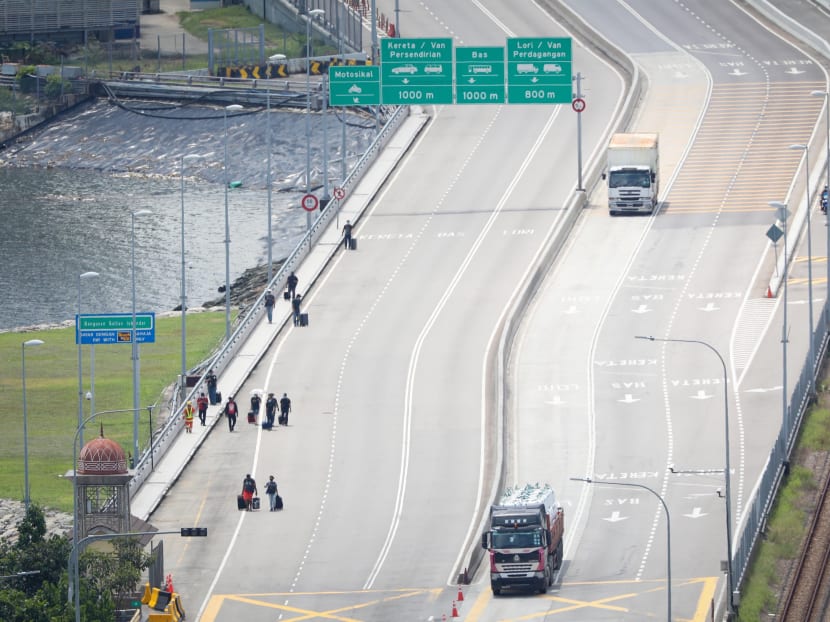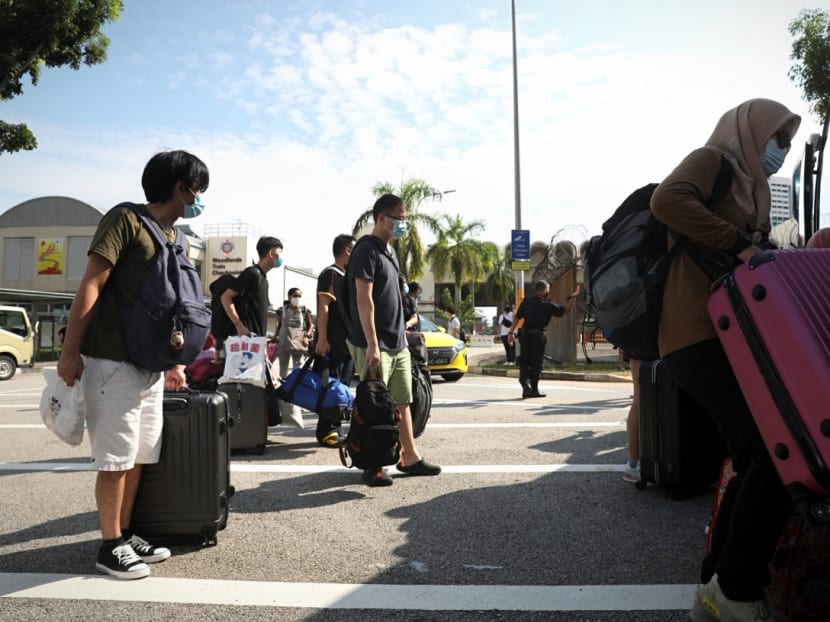M’sians happy to head home, but mixed emotions for returning workers as cross-border travel partially resumes
SINGAPORE — At the crack of dawn on Monday (Aug 17), nearly 50 people were standing in line at the entrance to the Woodlands Checkpoint with their luggage in tow.
- The partial resumption of cross-border travel was a long time coming for Malaysians, Singaporeans
- For many Malaysians heading home, it has been at least five months since they saw their families
- Malaysians returning to work in Singapore spoke of mixed emotions
SINGAPORE — At the crack of dawn on Monday (Aug 17), nearly 50 people were standing in line at the entrance to the Woodlands Checkpoint with their luggage in tow.
They were eagerly waiting to enter Malaysia, even though the immigration office at Johor Baru was not scheduled to open until half an hour later, at 7am.
Among the early birds was Ms Anusuya Kalathurai, a 32-year-old Malaysian dialysis nurse who works in Singapore.
Like many other Malaysians who were waiting to cross the Causeway, the last time she saw her family was five months ago, just before Malaysia and Singapore imposed travel restrictions to curb the spread of Covid-19.
But with the partial resumption of cross-border travel between the two countries on Monday, the resident of Seremban in Negeri Sembilan state will soon be reunited with her family. She is due to get married in the coming weeks.
Her parents have been helping her with the preparations in her absence.
“I am so nervous right now because I am not sure what the (wedding) procedure is going to be like,” Ms Kalathurai told TODAY.
In June, Singapore and Malaysia concluded an agreement that would allow cross-border travel between both countries under two schemes: The reciprocal green — or fast — lane for travellers on shorter visits, and the longer-term periodic commuting arrangement, under which workers must remain in either country for at least 90 days.
TODAY has asked Singapore's Immigration and Checkpoints Authority for the number of people who are expected to make the crossing on Monday.
Last week, Malaysia’s authorities said that applications for both schemes have maxed out until Wednesday. Johor Immigration Department director Baharuddin Tahir told Malaysian news agencies last Friday that about 6,000 Malaysians and Singaporeans are expected to travel between both countries from Monday to Wednesday.
Before the pandemic, more than 300,000 people crossed the 1km Causeway daily.
BITTERSWEET JOURNEYS
Although the move by the two governments to allow cross-border travel has been a long time coming for many Malaysians, the journey home was bittersweet for some.
Healthcare worker Christine Wang, 35, said she was anxious to return to Kuantan in Pahang state after she completes her quarantine in Johor Baru.
Her mother recently underwent cancer surgery.
“I am glad to be able to finally go back home, but it is not going to be a very happy return,” she said.
There were also Singaporeans entering Malaysia on Monday.
For Mr Yong Boon Tao, it was an opportunity to check on his business in Malaysia.
The 43-year-old said he works for a plastic production factory in Johor Baru and made frequent trips across the Causeway before the pandemic hit.
Mr Yong, who applied to enter Malaysia under the reciprocal green lane scheme, said being stuck in Singapore led to a lot of anxiety and uncertainty, because he could not be present at the factory.
Meanwhile, some Malaysians entering Singapore spoke of mixed emotions.
They said that they have had to leave their loved ones behind, even though returning to Singapore meant that they could finally work again.
Mr Muhd Syafiq Masruhin, 31, a production technician at a medical product company in Singapore, said he was fortunate that his employer still paid him a partial salary while he was stuck in Johor Baru.
His employer will also be subsidising the cost of his stay at a hotel in Singapore, where he will self-isolate before resuming work.
Work-pass holders approved under the periodic commuting arrangement scheme must serve a stay-home notice of at least seven days and take a Covid-19 swab test. They may start work once they have served the self-isolation order and test negative for the coronavirus.
Mr Syafiq said that while he was glad to be back in Singapore, he would miss his family dearly, after spending more time with them over the past five months.

People crossing the Causeway at about 2.10pm on Aug 17, 2020. Photo: Raj Nadarajan/TODAY
Factory operator Nurul Hidayah Norezan, 28, left her one-year-old son in the care of her mother in Malaysia.
Ms Norezan said that because there is no public transport plying the Causeway, she had to make the journey on foot with several others in the wee hours of the morning.
The walk took almost an hour because of the luggage she had to drag along.
"I am excited to be back to work again, but at the same time, I am sad that I will be separated from my one-year-old child,” she said.
“It was difficult parting from him, but at least I know he will be in good hands."









